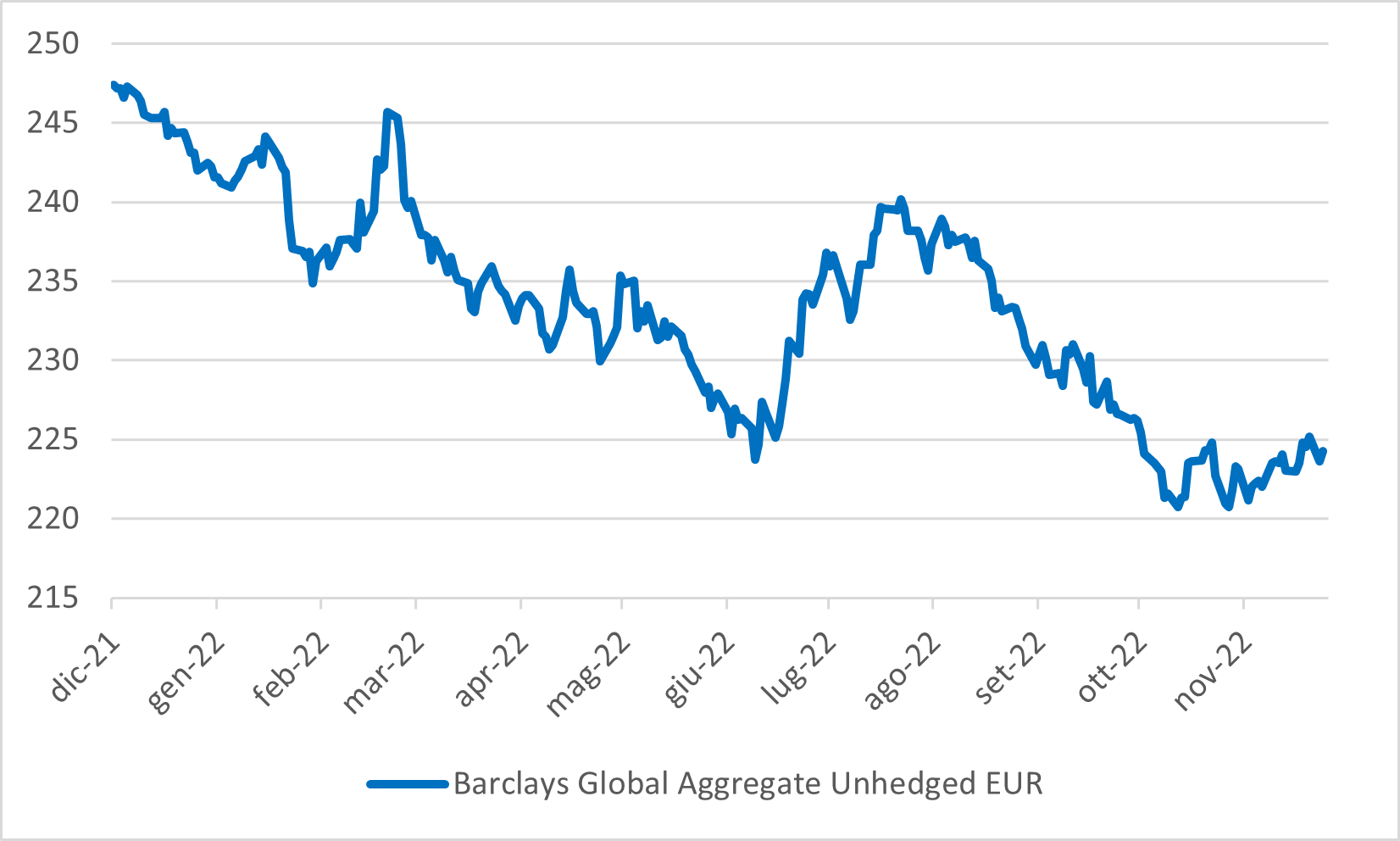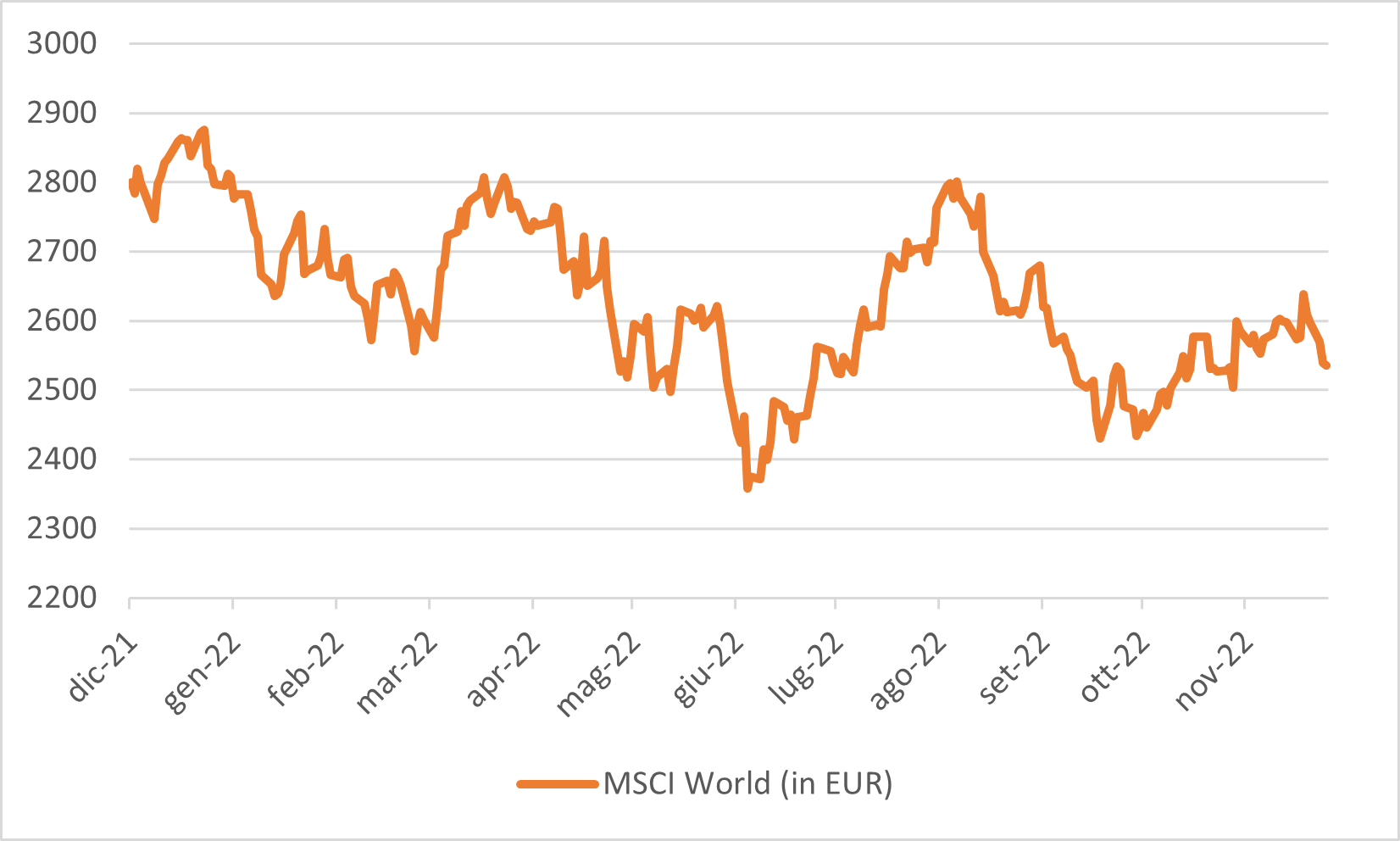 Generoso Perrotta, Head of Financial Advisory
Generoso Perrotta, Head of Financial Advisory
It is precisely in exceptional and more uncertain contexts that diversification plays a key role.

Negative returns for stocks and bonds. It has never happened before to see the two main asset classes register losses at the same time as in 2022, a very complicated year for investors. This is well explained by Generoso Perrotta head of Financial Advisory at Banca Generali, who below analyzes the situation in financial markets and outlines scenarios for 2023.
"To date, 2022 has delivered to the European investor negative performance for both equity (MSCI World -8.9 percent, since the beginning of the year in euros) and bond (Barclays Global Aggregate -8.2 percent, since the beginning of the year in euros) investment," Perrotta says, pointing out that "the rally in financial markets over the past month has allowed a partial recovery of the negative performance since the beginning of the year; however, the balance remains, for both equities and bonds, largely in the red."
The reasons that led to such a result, Perrotta emphasized, "can be attributed to the inflationary shock that has widely affected the global economy due to the rise in commodity prices linked, first, to the strong restart of activities after the post-pandemic reopenings and, later, to the rise in energy prices as a consequence of the Russian-Ukrainian conflict."

Internal Source
In addition, Banca Generali's Head of Financial Advisory points out that the sharp acceleration in inflation has led central banks to embark on decidedly restrictive monetary policies rather quickly, which has hurt investor sentiment about future prospects for growth in economic activity globally.
The direct consequence of the rise in benchmark interest rates in the world's major economies has been a rise in bond asset yields, which has been followed by a decline in equity indices due to heightened fears of a sharp economic slowdown due to a widespread downturn in demand.
In such an environment, the assets that have delivered positive results since the beginning of the year have been essentially three: energy commodities (WTI oil +2.6 percent in euros), energy sector equities (MSCI Europe Energy +31.5 percent in euros, S&P 500 Energy Index +64.6 percent in euros) and the U.S. dollar (Dollar Index +9.5 percent). "The latter," Perrotta adds, "has benefited from its nature as a safe haven asset in situations of uncertainty, the greater resilience of the U.S. economy, and the fact that the Federal Reserve was among the first central banks to raise benchmark rates. The performance of these assets remains positive since the beginning of the year despite the fact that they too have recently experienced a retracement: the former in the wake of fears of a greater global economic slowdown and lower prospective demand for oil, the U.S. dollar in the face of a greater likelihood that the Fed may slow in the pace of rate hikes sooner than expected."

Internal source
Banca Generali's head of Financial Advisory also points out that the surprisingly negative scenario that materialized during 2022 was difficult to predict because it was entirely due to the occurrence of an exceptional event such as the outbreak of the war conflict between Russia and Ukraine. "It is precisely in exceptional and more uncertain contexts that diversification," Perrotta points out, "in fact plays its fundamental role, which is to foster investment resilience. Careful diversification of portfolios, through a structured top-down/strategic approach, is the tool needed to rebuild assets affected by such a negative 2022."
So, with that being said, what time horizon should investors set for meaningful returns?
"The investment time horizon is defined in relation to the individual client's characteristics, risk appetite and the type of portfolio best suited to capture their needs," says Perrotta, who adds, "However, in principle, diversification produces appreciable effects more in the medium to long term than in the short term."
Here then arises a question: how to deal with markets in 2023? "Although inflation in the U.S. has shown the first signs of slowing and the Fed seems intent on moderating the intensity of upcoming rate hikes, and although China is beginning to remove health care restrictions, with predictable positive effects on economic growth," Perrotta says, "it cannot be taken for granted that the current bullish phase in equity markets can still last. In order for the stock market rebound we are witnessing to turn into a more solid and lasting movement, we will need confirmation on whether inflation will actually return to central bank targets and on the resilience of the major economies, which as of today still seem set to feel the effects of monetary tightening and the energy crisis. It is therefore necessary to monitor the situation closely, without giving in to either fear or enthusiasm."
For the head of Banca Generali's Financial Advisory area, on the other hand, "the outlook is different for bond markets, where yields are expected to continue to decline as a result of less aggressive and tendentially restrictive monetary policy choices by the main central banks. Bond investment therefore appears increasingly attractive, thanks in part to a particularly attractive level of yields on offer."
 Generoso Perrotta, Head of Financial Advisory
Generoso Perrotta, Head of Financial Advisory
It is precisely in exceptional and more uncertain contexts that diversification plays a key role.